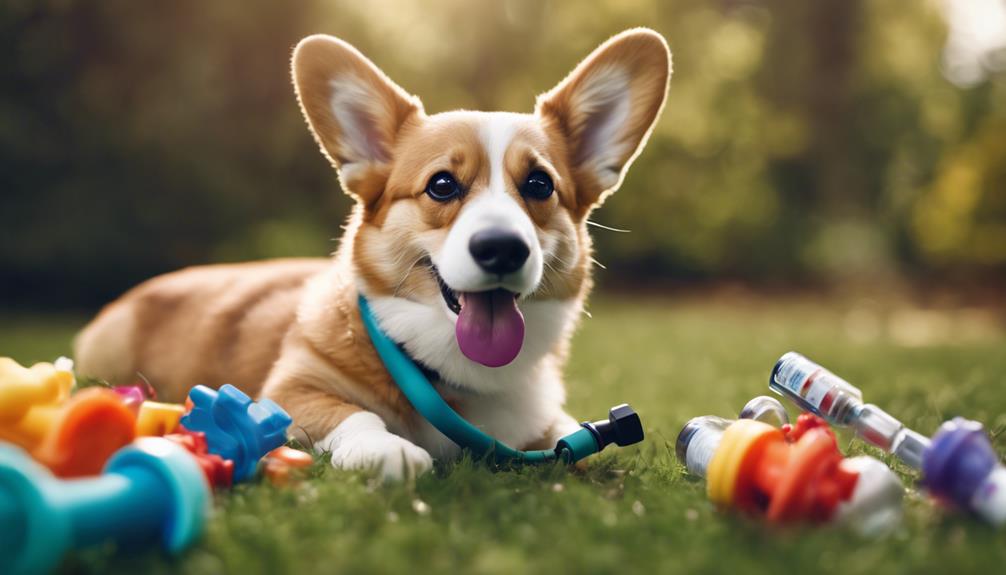Proper care and attention to your pup's health are crucial for ensuring a long and vibrant life. This includes adhering to a comprehensive vaccination schedule and implementing several key health strategies. From core vaccinations to dietary considerations and regular exercise, understanding these components can significantly impact your dog's well-being. However, the nuances of effective health management extend beyond the basics. What specific vaccinations should be prioritized, and how can you identify potential health issues before they become serious? Exploring these questions is essential for every responsible pet owner.
Importance of Vaccinations

Vaccinations are essential for protecting dogs from a range of preventable diseases and ensuring their overall health and longevity.
For puppies, vaccinations play a crucial role in building strong puppy immunity, helping them resist infections as they grow.
It is vital to understand that vaccination myths can create confusion among pet owners. For instance, some believe that vaccinating dogs too early can harm them, while others think that their pets do not need shots if they appear healthy.
In reality, vaccinating puppies according to a veterinarian's schedule is crucial for their well-being.
Core Vaccines for Corgis
Understanding core vaccines for Corgis is crucial for their health and well-being.
These vaccines protect against serious diseases, and following a proper vaccination timeline is essential to ensure your pup receives them at the right stages of life.
In the following sections, we will outline the essential core vaccines and the recommended schedule for administering them.
Essential Core Vaccines
Core vaccines are crucial for Corgis, as they provide essential protection against common and potentially life-threatening diseases. These vaccines typically include those for distemper, parvovirus, adenovirus, and rabies.
Understanding the vaccination benefits is vital, as these core vaccines significantly reduce the risk of severe illness. Unfortunately, vaccine myths often circulate, leading to confusion among pet owners. For instance, some believe that vaccines are unnecessary after a certain age, but this is false; dogs require ongoing protection throughout their lives.
Ensuring your Corgi receives their core vaccines not only safeguards their health but also contributes to the overall wellbeing of the canine community. Always consult your veterinarian for the best vaccination plan tailored to your pet.
Vaccination Timeline Overview
A well-structured vaccination timeline is essential for ensuring that Corgis receive their core vaccines at the appropriate stages of development. Understanding this timeline helps dispel common vaccination myths, such as the idea that vaccines are unnecessary.
Key milestones in the vaccination timeline include:
- 6-8 weeks: First round of vaccinations (DAPP).
- 12-16 weeks: Second round of vaccinations and rabies vaccine.
While some pet owners worry about vaccine side effects, most are mild and temporary. It's crucial to discuss any concerns with your veterinarian to ensure your Corgi remains healthy and protected.
Following this timeline will help safeguard your pup against serious diseases, ensuring a happy and active life.
Recommended Schedule Overview

Establishing a recommended schedule for your pup is essential to ensure their overall health and well-being throughout their life stages. A well-structured plan includes crucial aspects such as puppy socialization, which should begin early to help your dog develop confidence and good behavior around other dogs and people.
Regular dental care is also vital, as poor oral hygiene can lead to serious health issues.
Consider scheduling these activities:
- Puppy Socialization: Start between 3 to 14 weeks.
Incorporating these elements into your pup's routine fosters a healthy lifestyle and paves the way for a happy, well-adjusted adult dog.
Health Checks and Screenings
Regular health checks and screenings are vital for monitoring your pup's development and catching potential health issues early. These preventive care measures help ensure your dog remains healthy and happy throughout their life.
Consider the following key aspects of health checks and screenings:
- Routine veterinary visits: Schedule annual check-ups to assess general health.
- Vaccination updates: Ensure your pup receives necessary vaccinations on time.
Nutrition and Dietary Needs

Proper nutrition is vital for your pup's overall health and well-being.
A balanced diet provides essential nutrients, such as proteins, fats, vitamins, and minerals, needed for growth, energy, and a strong immune system.
Understanding these dietary needs can help you make informed choices about your dog's food, ensuring they lead a happy and healthy life.
Balanced Diet Importance
A balanced diet is essential for a dog's overall health, providing the necessary nutrients to support growth, energy levels, and immune function.
Feeding your pup a variety of foods helps ensure they receive proper nutrition. Homemade meals can be a great way to customize your dog's diet, but it's crucial to ensure they meet all dietary needs. Additionally, dietary supplements may be useful in addressing specific deficiencies.
Consider the following components in a balanced diet:
- High-quality protein sources (meat, fish)
- Whole grains and vegetables for fiber
Essential Nutrients Overview
Understanding the essential nutrients required for canine health is crucial for pet owners seeking to optimize their dog's diet and overall well-being.
Dogs need a balanced intake of proteins, fats, carbohydrates, vitamins, and minerals. Protein serves as a building block for muscles and tissues, while fats provide energy and support cell function. Carbohydrates offer a quick energy source, and vitamins and minerals are vital for various bodily functions.
Nutrient sources such as lean meats, fish, vegetables, and grains can be included in a dog's diet. Additionally, dietary supplements may help fill in any nutritional gaps, ensuring your pup receives all necessary components.
Exercise and Mental Stimulation
Regular exercise and mental stimulation are essential components for maintaining your dog's overall health and well-being. Engaging your pup in regular activity not only promotes physical fitness but also enhances cognitive function.
Incorporating a variety of playtime activities and interactive toys can significantly enrich your dog's daily routine. Consider the following:
- Daily walks or runs to expend energy and enjoy the outdoors.
- Puzzle toys that challenge their problem-solving skills and keep them engaged.
Common Health Issues in Corgis

Despite their playful nature and energetic disposition, Corgis are prone to specific health issues that owners should be aware of to ensure their well-being.
One common concern is obesity, which can lead to serious conditions like diabetes and joint problems. Effective corgi weight management includes regular exercise and portion control in their diet.
Additionally, dental health is crucial; many Corgis face dental disease due to plaque buildup. Proper corgi dental care involves regular tooth brushing and providing dental chews to help maintain their oral hygiene.

